CPPREP4002 Case Study: Ethical Practice in Real Estate - Hinton Case
VerifiedAdded on 2023/06/11
|22
|5217
|292
Case Study
AI Summary
This case study examines the Hinton & Ors v Commissioner case to explore ethical practices in real estate, focusing on consumer protection requirements and breaches. It summarizes the unethical practices, including lying, misleading, and non-disclosure of material facts, particularly the triple murder at the property, and identifies the impact on consumers and the agency. The study identifies breaches of consumer protection legislation, such as unfair contract terms and unconscionable conduct, and outlines the risks of unethical practices for consumers, agencies, and the real estate industry. The analysis uses the Azure Beach Incident report form to record the events and references relevant consumer protection legislation and resources from the ACCC and NSW Fair Trading. The case study highlights the importance of honesty, transparency, and ethical conduct in real estate to maintain trust and avoid legal repercussions.
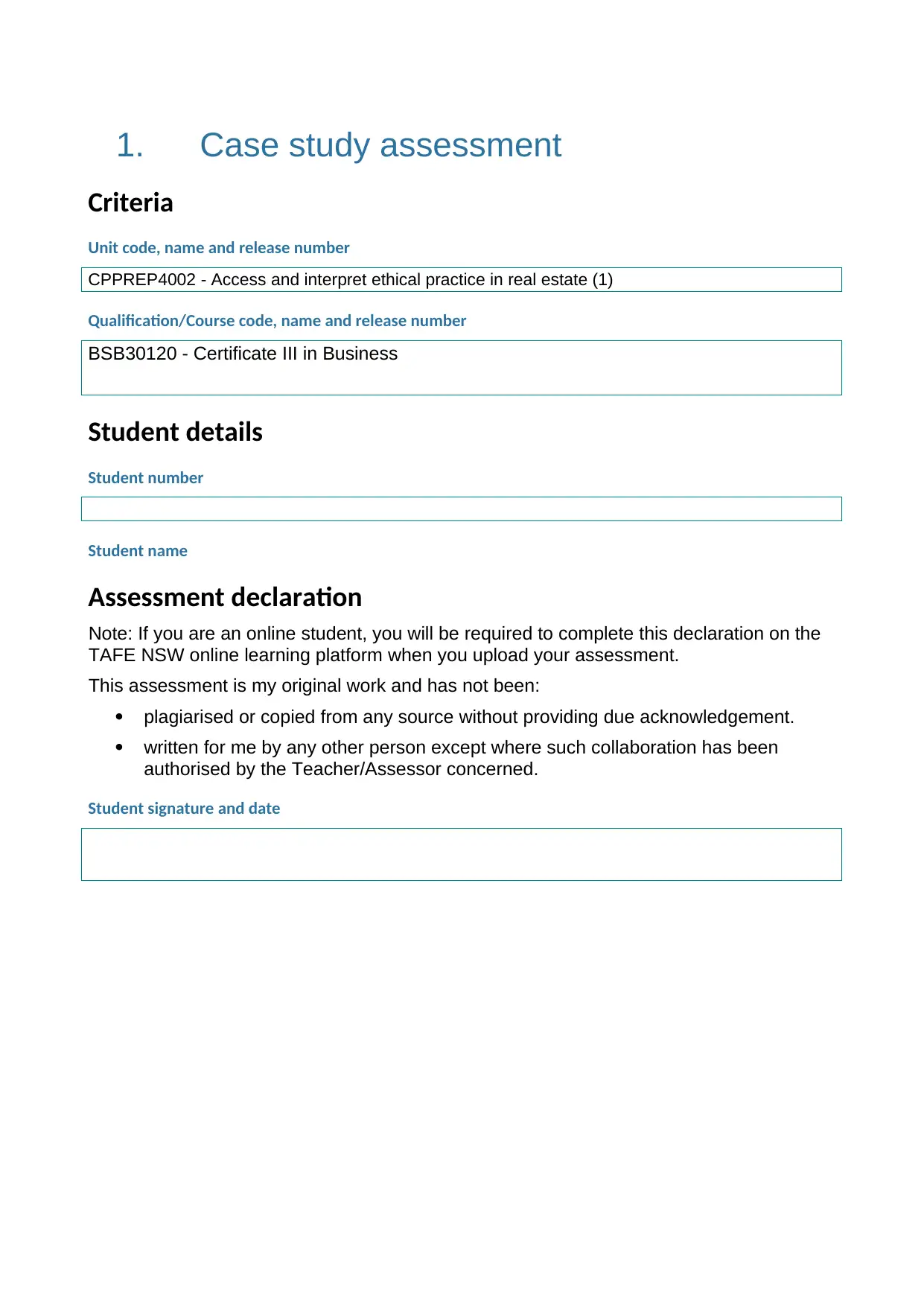
1. Case study assessment
Criteria
Unit code, name and release number
CPPREP4002 - Access and interpret ethical practice in real estate (1)
Qualification/Course code, name and release number
BSB30120 - Certificate III in Business
Student details
Student number
Student name
Assessment declaration
Note: If you are an online student, you will be required to complete this declaration on the
TAFE NSW online learning platform when you upload your assessment.
This assessment is my original work and has not been:
plagiarised or copied from any source without providing due acknowledgement.
written for me by any other person except where such collaboration has been
authorised by the Teacher/Assessor concerned.
Student signature and date
Criteria
Unit code, name and release number
CPPREP4002 - Access and interpret ethical practice in real estate (1)
Qualification/Course code, name and release number
BSB30120 - Certificate III in Business
Student details
Student number
Student name
Assessment declaration
Note: If you are an online student, you will be required to complete this declaration on the
TAFE NSW online learning platform when you upload your assessment.
This assessment is my original work and has not been:
plagiarised or copied from any source without providing due acknowledgement.
written for me by any other person except where such collaboration has been
authorised by the Teacher/Assessor concerned.
Student signature and date
Paraphrase This Document
Need a fresh take? Get an instant paraphrase of this document with our AI Paraphraser

.
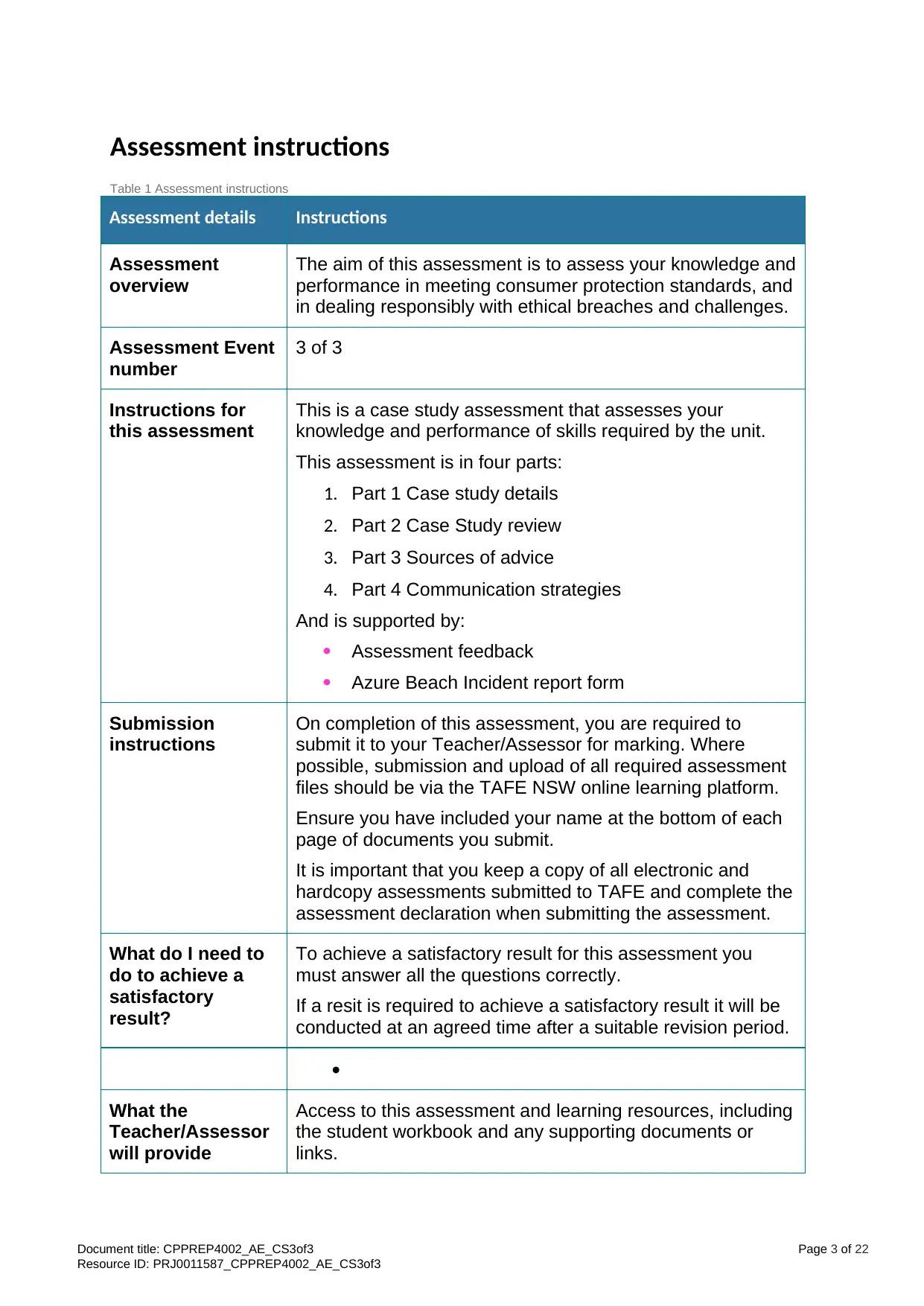
Assessment instructions
Table 1 Assessment instructions
Assessment details Instructions
Assessment
overview
The aim of this assessment is to assess your knowledge and
performance in meeting consumer protection standards, and
in dealing responsibly with ethical breaches and challenges.
Assessment Event
number
3 of 3
Instructions for
this assessment
This is a case study assessment that assesses your
knowledge and performance of skills required by the unit.
This assessment is in four parts:
1. Part 1 Case study details
2. Part 2 Case Study review
3. Part 3 Sources of advice
4. Part 4 Communication strategies
And is supported by:
Assessment feedback
Azure Beach Incident report form
Submission
instructions
On completion of this assessment, you are required to
submit it to your Teacher/Assessor for marking. Where
possible, submission and upload of all required assessment
files should be via the TAFE NSW online learning platform.
Ensure you have included your name at the bottom of each
page of documents you submit.
It is important that you keep a copy of all electronic and
hardcopy assessments submitted to TAFE and complete the
assessment declaration when submitting the assessment.
What do I need to
do to achieve a
satisfactory
result?
To achieve a satisfactory result for this assessment you
must answer all the questions correctly.
If a resit is required to achieve a satisfactory result it will be
conducted at an agreed time after a suitable revision period.
•
What the
Teacher/Assessor
will provide
Access to this assessment and learning resources, including
the student workbook and any supporting documents or
links.
Document title: CPPREP4002_AE_CS3of3 Page 3 of 22
Resource ID: PRJ0011587_CPPREP4002_AE_CS3of3
Table 1 Assessment instructions
Assessment details Instructions
Assessment
overview
The aim of this assessment is to assess your knowledge and
performance in meeting consumer protection standards, and
in dealing responsibly with ethical breaches and challenges.
Assessment Event
number
3 of 3
Instructions for
this assessment
This is a case study assessment that assesses your
knowledge and performance of skills required by the unit.
This assessment is in four parts:
1. Part 1 Case study details
2. Part 2 Case Study review
3. Part 3 Sources of advice
4. Part 4 Communication strategies
And is supported by:
Assessment feedback
Azure Beach Incident report form
Submission
instructions
On completion of this assessment, you are required to
submit it to your Teacher/Assessor for marking. Where
possible, submission and upload of all required assessment
files should be via the TAFE NSW online learning platform.
Ensure you have included your name at the bottom of each
page of documents you submit.
It is important that you keep a copy of all electronic and
hardcopy assessments submitted to TAFE and complete the
assessment declaration when submitting the assessment.
What do I need to
do to achieve a
satisfactory
result?
To achieve a satisfactory result for this assessment you
must answer all the questions correctly.
If a resit is required to achieve a satisfactory result it will be
conducted at an agreed time after a suitable revision period.
•
What the
Teacher/Assessor
will provide
Access to this assessment and learning resources, including
the student workbook and any supporting documents or
links.
Document title: CPPREP4002_AE_CS3of3 Page 3 of 22
Resource ID: PRJ0011587_CPPREP4002_AE_CS3of3
⊘ This is a preview!⊘
Do you want full access?
Subscribe today to unlock all pages.

Trusted by 1+ million students worldwide
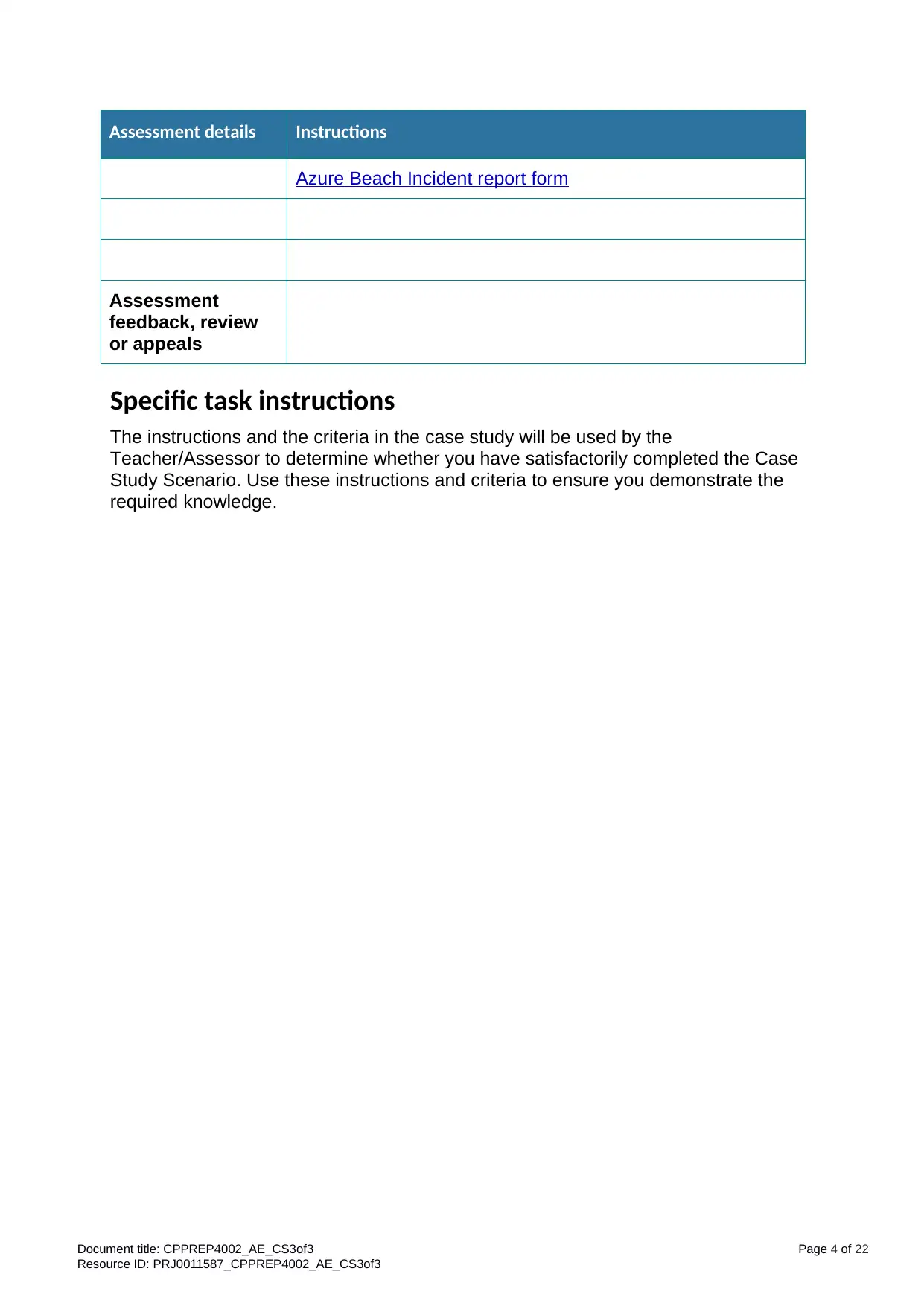
Assessment details Instructions
Azure Beach Incident report form
Assessment
feedback, review
or appeals
Specific task instructions
The instructions and the criteria in the case study will be used by the
Teacher/Assessor to determine whether you have satisfactorily completed the Case
Study Scenario. Use these instructions and criteria to ensure you demonstrate the
required knowledge.
Document title: CPPREP4002_AE_CS3of3 Page 4 of 22
Resource ID: PRJ0011587_CPPREP4002_AE_CS3of3
Azure Beach Incident report form
Assessment
feedback, review
or appeals
Specific task instructions
The instructions and the criteria in the case study will be used by the
Teacher/Assessor to determine whether you have satisfactorily completed the Case
Study Scenario. Use these instructions and criteria to ensure you demonstrate the
required knowledge.
Document title: CPPREP4002_AE_CS3of3 Page 4 of 22
Resource ID: PRJ0011587_CPPREP4002_AE_CS3of3
Paraphrase This Document
Need a fresh take? Get an instant paraphrase of this document with our AI Paraphraser
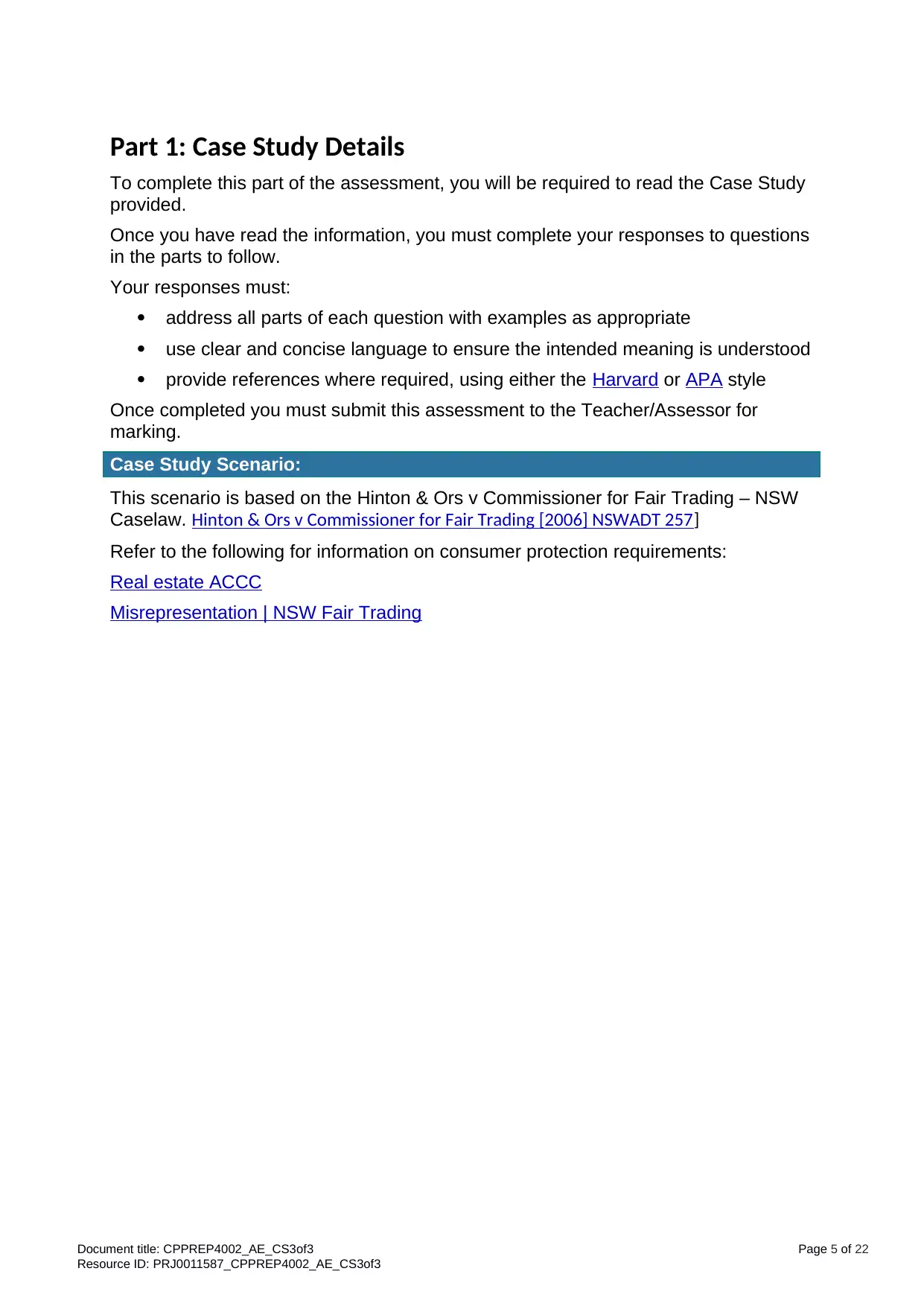
Part 1: Case Study Details
To complete this part of the assessment, you will be required to read the Case Study
provided.
Once you have read the information, you must complete your responses to questions
in the parts to follow.
Your responses must:
address all parts of each question with examples as appropriate
use clear and concise language to ensure the intended meaning is understood
provide references where required, using either the Harvard or APA style
Once completed you must submit this assessment to the Teacher/Assessor for
marking.
Case Study Scenario:
This scenario is based on the Hinton & Ors v Commissioner for Fair Trading – NSW
Caselaw. Hinton & Ors v Commissioner for Fair Trading [2006] NSWADT 257]
Refer to the following for information on consumer protection requirements:
Real estate ACCC
Misrepresentation | NSW Fair Trading
Document title: CPPREP4002_AE_CS3of3 Page 5 of 22
Resource ID: PRJ0011587_CPPREP4002_AE_CS3of3
To complete this part of the assessment, you will be required to read the Case Study
provided.
Once you have read the information, you must complete your responses to questions
in the parts to follow.
Your responses must:
address all parts of each question with examples as appropriate
use clear and concise language to ensure the intended meaning is understood
provide references where required, using either the Harvard or APA style
Once completed you must submit this assessment to the Teacher/Assessor for
marking.
Case Study Scenario:
This scenario is based on the Hinton & Ors v Commissioner for Fair Trading – NSW
Caselaw. Hinton & Ors v Commissioner for Fair Trading [2006] NSWADT 257]
Refer to the following for information on consumer protection requirements:
Real estate ACCC
Misrepresentation | NSW Fair Trading
Document title: CPPREP4002_AE_CS3of3 Page 5 of 22
Resource ID: PRJ0011587_CPPREP4002_AE_CS3of3
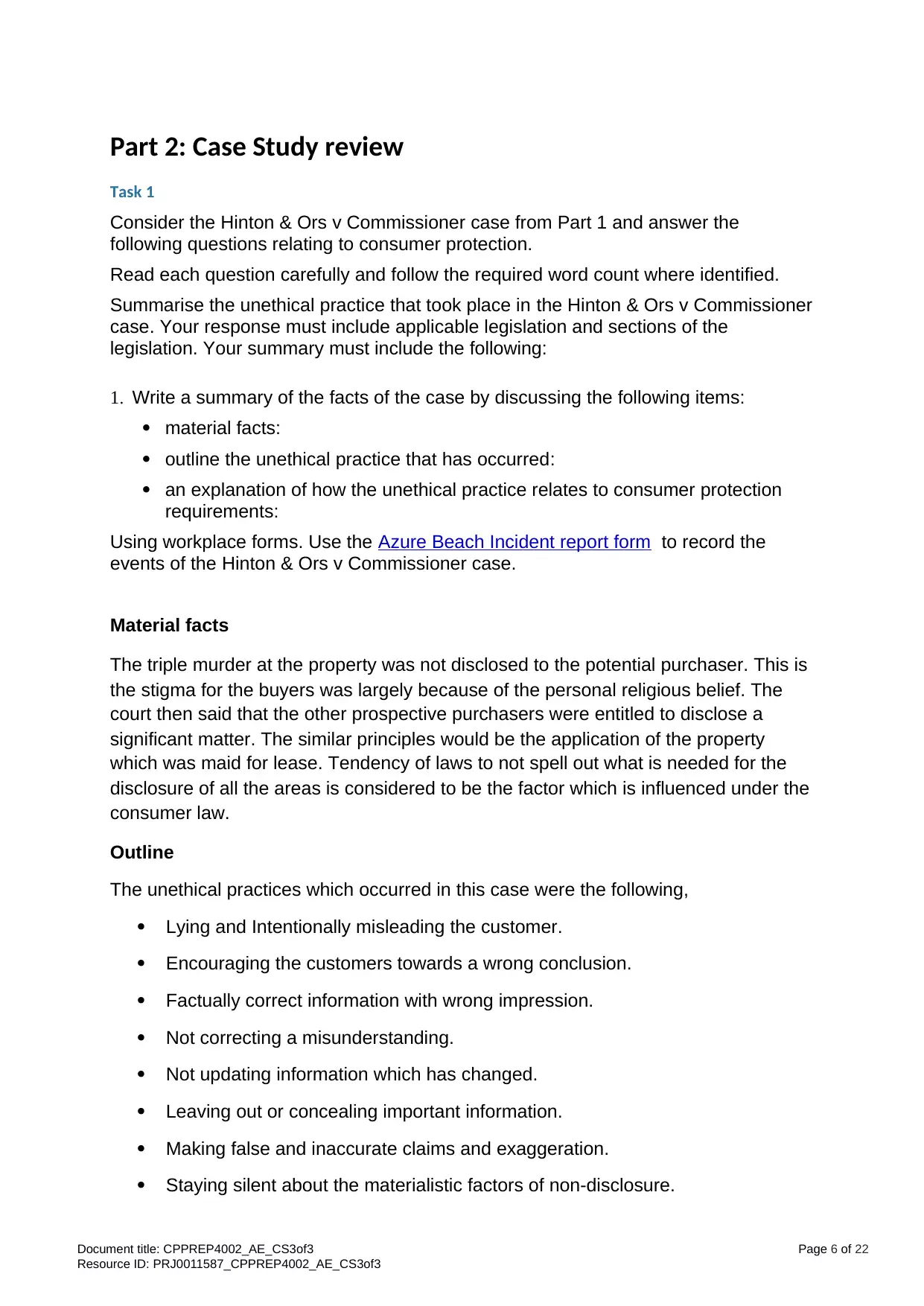
Part 2: Case Study review
Task 1
Consider the Hinton & Ors v Commissioner case from Part 1 and answer the
following questions relating to consumer protection.
Read each question carefully and follow the required word count where identified.
Summarise the unethical practice that took place in the Hinton & Ors v Commissioner
case. Your response must include applicable legislation and sections of the
legislation. Your summary must include the following:
1. Write a summary of the facts of the case by discussing the following items:
material facts:
outline the unethical practice that has occurred:
an explanation of how the unethical practice relates to consumer protection
requirements:
Using workplace forms. Use the Azure Beach Incident report form to record the
events of the Hinton & Ors v Commissioner case.
Material facts
The triple murder at the property was not disclosed to the potential purchaser. This is
the stigma for the buyers was largely because of the personal religious belief. The
court then said that the other prospective purchasers were entitled to disclose a
significant matter. The similar principles would be the application of the property
which was maid for lease. Tendency of laws to not spell out what is needed for the
disclosure of all the areas is considered to be the factor which is influenced under the
consumer law.
Outline
The unethical practices which occurred in this case were the following,
Lying and Intentionally misleading the customer.
Encouraging the customers towards a wrong conclusion.
Factually correct information with wrong impression.
Not correcting a misunderstanding.
Not updating information which has changed.
Leaving out or concealing important information.
Making false and inaccurate claims and exaggeration.
Staying silent about the materialistic factors of non-disclosure.
Document title: CPPREP4002_AE_CS3of3 Page 6 of 22
Resource ID: PRJ0011587_CPPREP4002_AE_CS3of3
Task 1
Consider the Hinton & Ors v Commissioner case from Part 1 and answer the
following questions relating to consumer protection.
Read each question carefully and follow the required word count where identified.
Summarise the unethical practice that took place in the Hinton & Ors v Commissioner
case. Your response must include applicable legislation and sections of the
legislation. Your summary must include the following:
1. Write a summary of the facts of the case by discussing the following items:
material facts:
outline the unethical practice that has occurred:
an explanation of how the unethical practice relates to consumer protection
requirements:
Using workplace forms. Use the Azure Beach Incident report form to record the
events of the Hinton & Ors v Commissioner case.
Material facts
The triple murder at the property was not disclosed to the potential purchaser. This is
the stigma for the buyers was largely because of the personal religious belief. The
court then said that the other prospective purchasers were entitled to disclose a
significant matter. The similar principles would be the application of the property
which was maid for lease. Tendency of laws to not spell out what is needed for the
disclosure of all the areas is considered to be the factor which is influenced under the
consumer law.
Outline
The unethical practices which occurred in this case were the following,
Lying and Intentionally misleading the customer.
Encouraging the customers towards a wrong conclusion.
Factually correct information with wrong impression.
Not correcting a misunderstanding.
Not updating information which has changed.
Leaving out or concealing important information.
Making false and inaccurate claims and exaggeration.
Staying silent about the materialistic factors of non-disclosure.
Document title: CPPREP4002_AE_CS3of3 Page 6 of 22
Resource ID: PRJ0011587_CPPREP4002_AE_CS3of3
⊘ This is a preview!⊘
Do you want full access?
Subscribe today to unlock all pages.

Trusted by 1+ million students worldwide
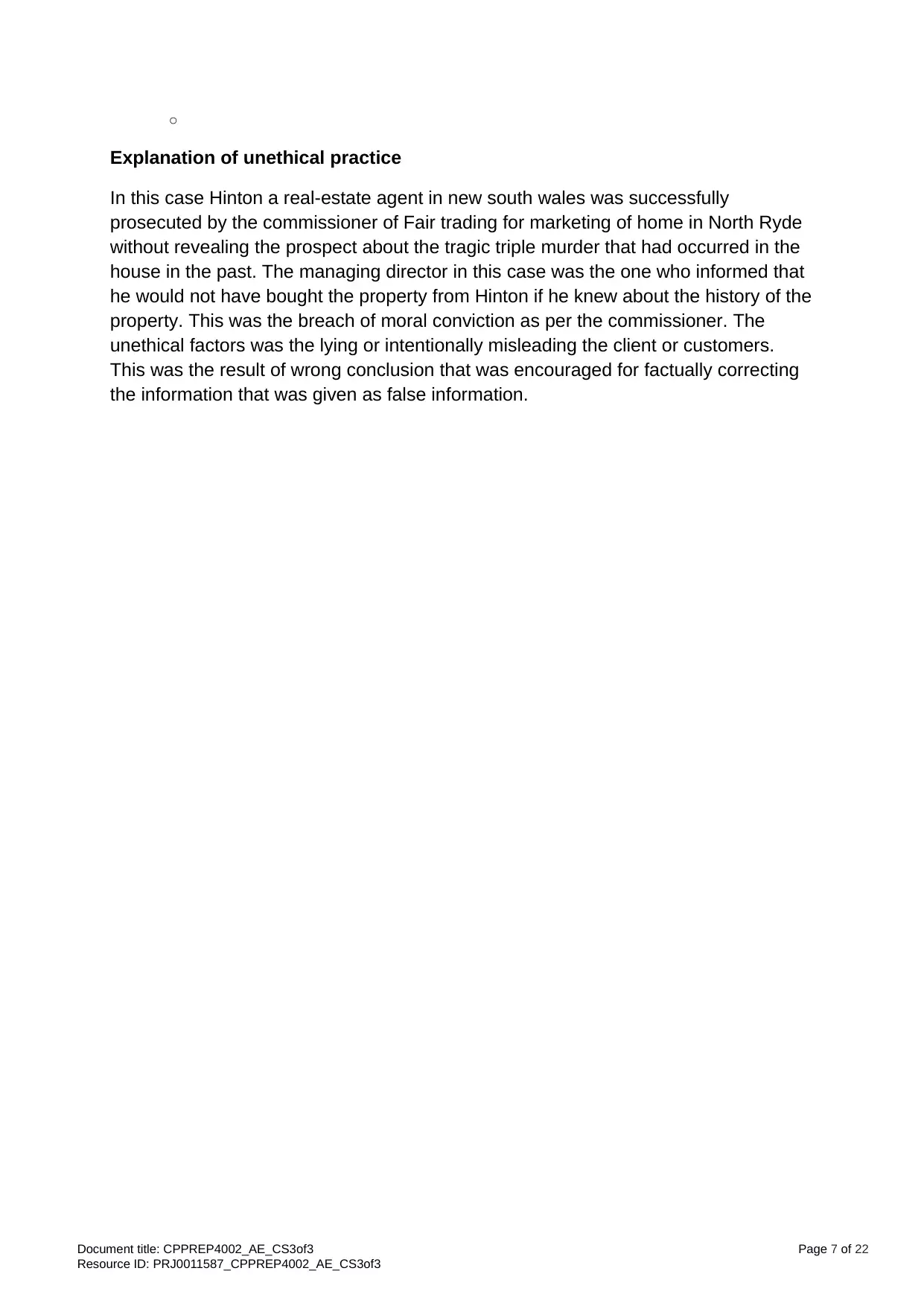
◦
Explanation of unethical practice
In this case Hinton a real-estate agent in new south wales was successfully
prosecuted by the commissioner of Fair trading for marketing of home in North Ryde
without revealing the prospect about the tragic triple murder that had occurred in the
house in the past. The managing director in this case was the one who informed that
he would not have bought the property from Hinton if he knew about the history of the
property. This was the breach of moral conviction as per the commissioner. The
unethical factors was the lying or intentionally misleading the client or customers.
This was the result of wrong conclusion that was encouraged for factually correcting
the information that was given as false information.
Document title: CPPREP4002_AE_CS3of3 Page 7 of 22
Resource ID: PRJ0011587_CPPREP4002_AE_CS3of3
Explanation of unethical practice
In this case Hinton a real-estate agent in new south wales was successfully
prosecuted by the commissioner of Fair trading for marketing of home in North Ryde
without revealing the prospect about the tragic triple murder that had occurred in the
house in the past. The managing director in this case was the one who informed that
he would not have bought the property from Hinton if he knew about the history of the
property. This was the breach of moral conviction as per the commissioner. The
unethical factors was the lying or intentionally misleading the client or customers.
This was the result of wrong conclusion that was encouraged for factually correcting
the information that was given as false information.
Document title: CPPREP4002_AE_CS3of3 Page 7 of 22
Resource ID: PRJ0011587_CPPREP4002_AE_CS3of3
Paraphrase This Document
Need a fresh take? Get an instant paraphrase of this document with our AI Paraphraser
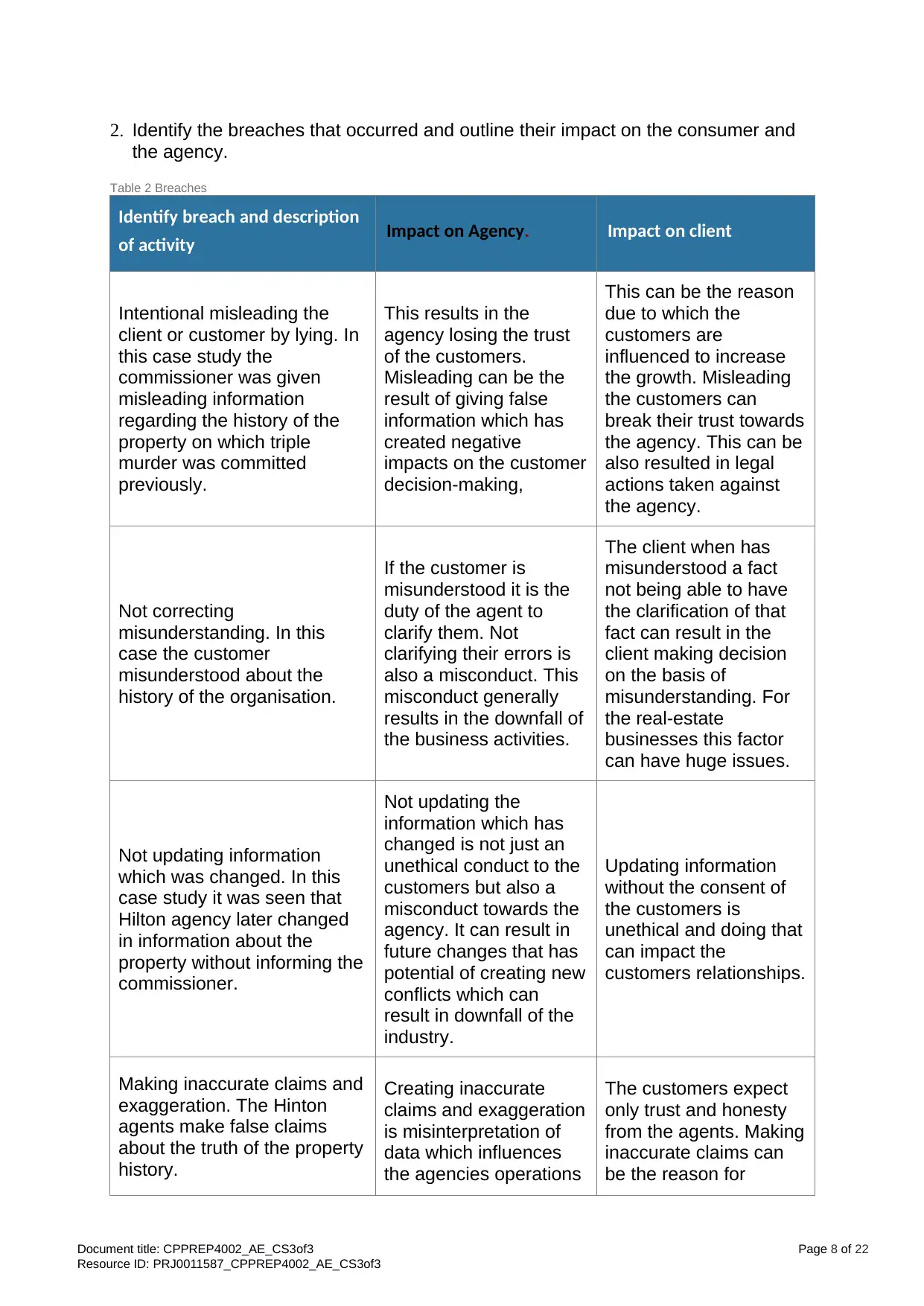
2. Identify the breaches that occurred and outline their impact on the consumer and
the agency.
Table 2 Breaches
Identify breach and description
of activity Impact on Agency. Impact on client
Intentional misleading the
client or customer by lying. In
this case study the
commissioner was given
misleading information
regarding the history of the
property on which triple
murder was committed
previously.
This results in the
agency losing the trust
of the customers.
Misleading can be the
result of giving false
information which has
created negative
impacts on the customer
decision-making,
This can be the reason
due to which the
customers are
influenced to increase
the growth. Misleading
the customers can
break their trust towards
the agency. This can be
also resulted in legal
actions taken against
the agency.
Not correcting
misunderstanding. In this
case the customer
misunderstood about the
history of the organisation.
If the customer is
misunderstood it is the
duty of the agent to
clarify them. Not
clarifying their errors is
also a misconduct. This
misconduct generally
results in the downfall of
the business activities.
The client when has
misunderstood a fact
not being able to have
the clarification of that
fact can result in the
client making decision
on the basis of
misunderstanding. For
the real-estate
businesses this factor
can have huge issues.
Not updating information
which was changed. In this
case study it was seen that
Hilton agency later changed
in information about the
property without informing the
commissioner.
Not updating the
information which has
changed is not just an
unethical conduct to the
customers but also a
misconduct towards the
agency. It can result in
future changes that has
potential of creating new
conflicts which can
result in downfall of the
industry.
Updating information
without the consent of
the customers is
unethical and doing that
can impact the
customers relationships.
Making inaccurate claims and
exaggeration. The Hinton
agents make false claims
about the truth of the property
history.
Creating inaccurate
claims and exaggeration
is misinterpretation of
data which influences
the agencies operations
The customers expect
only trust and honesty
from the agents. Making
inaccurate claims can
be the reason for
Document title: CPPREP4002_AE_CS3of3 Page 8 of 22
Resource ID: PRJ0011587_CPPREP4002_AE_CS3of3
the agency.
Table 2 Breaches
Identify breach and description
of activity Impact on Agency. Impact on client
Intentional misleading the
client or customer by lying. In
this case study the
commissioner was given
misleading information
regarding the history of the
property on which triple
murder was committed
previously.
This results in the
agency losing the trust
of the customers.
Misleading can be the
result of giving false
information which has
created negative
impacts on the customer
decision-making,
This can be the reason
due to which the
customers are
influenced to increase
the growth. Misleading
the customers can
break their trust towards
the agency. This can be
also resulted in legal
actions taken against
the agency.
Not correcting
misunderstanding. In this
case the customer
misunderstood about the
history of the organisation.
If the customer is
misunderstood it is the
duty of the agent to
clarify them. Not
clarifying their errors is
also a misconduct. This
misconduct generally
results in the downfall of
the business activities.
The client when has
misunderstood a fact
not being able to have
the clarification of that
fact can result in the
client making decision
on the basis of
misunderstanding. For
the real-estate
businesses this factor
can have huge issues.
Not updating information
which was changed. In this
case study it was seen that
Hilton agency later changed
in information about the
property without informing the
commissioner.
Not updating the
information which has
changed is not just an
unethical conduct to the
customers but also a
misconduct towards the
agency. It can result in
future changes that has
potential of creating new
conflicts which can
result in downfall of the
industry.
Updating information
without the consent of
the customers is
unethical and doing that
can impact the
customers relationships.
Making inaccurate claims and
exaggeration. The Hinton
agents make false claims
about the truth of the property
history.
Creating inaccurate
claims and exaggeration
is misinterpretation of
data which influences
the agencies operations
The customers expect
only trust and honesty
from the agents. Making
inaccurate claims can
be the reason for
Document title: CPPREP4002_AE_CS3of3 Page 8 of 22
Resource ID: PRJ0011587_CPPREP4002_AE_CS3of3
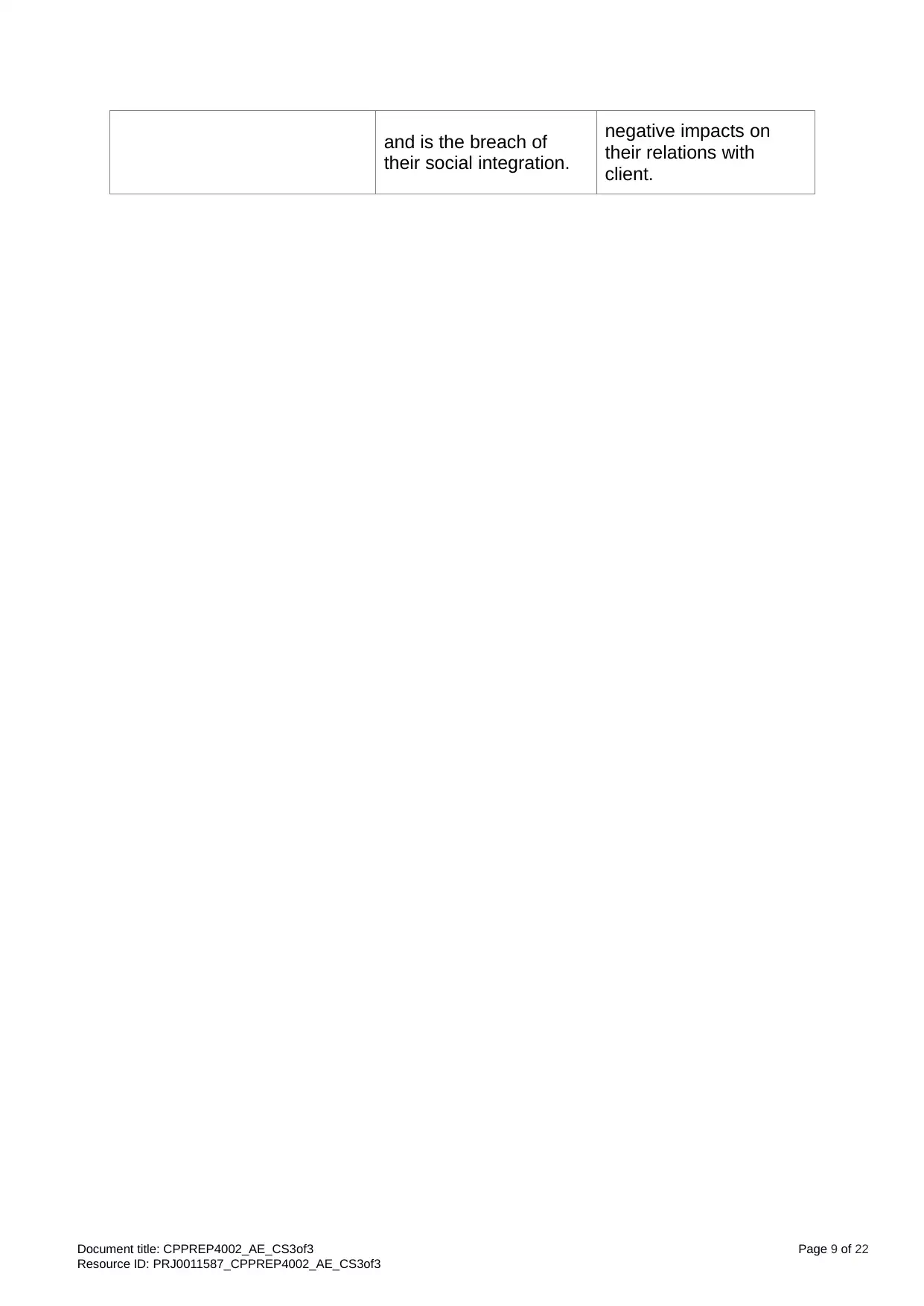
and is the breach of
their social integration.
negative impacts on
their relations with
client.
Document title: CPPREP4002_AE_CS3of3 Page 9 of 22
Resource ID: PRJ0011587_CPPREP4002_AE_CS3of3
their social integration.
negative impacts on
their relations with
client.
Document title: CPPREP4002_AE_CS3of3 Page 9 of 22
Resource ID: PRJ0011587_CPPREP4002_AE_CS3of3
⊘ This is a preview!⊘
Do you want full access?
Subscribe today to unlock all pages.

Trusted by 1+ million students worldwide
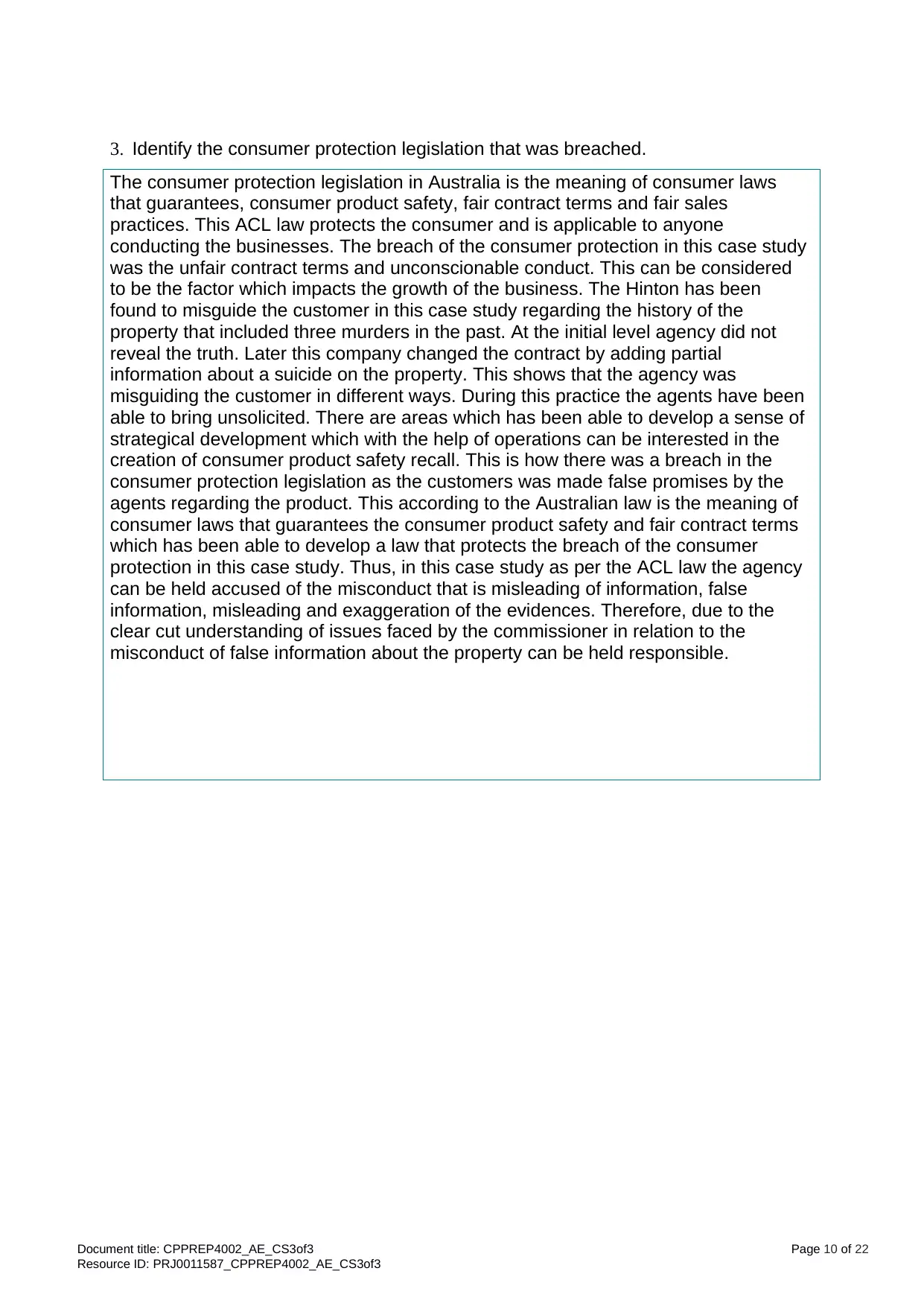
3. Identify the consumer protection legislation that was breached.
The consumer protection legislation in Australia is the meaning of consumer laws
that guarantees, consumer product safety, fair contract terms and fair sales
practices. This ACL law protects the consumer and is applicable to anyone
conducting the businesses. The breach of the consumer protection in this case study
was the unfair contract terms and unconscionable conduct. This can be considered
to be the factor which impacts the growth of the business. The Hinton has been
found to misguide the customer in this case study regarding the history of the
property that included three murders in the past. At the initial level agency did not
reveal the truth. Later this company changed the contract by adding partial
information about a suicide on the property. This shows that the agency was
misguiding the customer in different ways. During this practice the agents have been
able to bring unsolicited. There are areas which has been able to develop a sense of
strategical development which with the help of operations can be interested in the
creation of consumer product safety recall. This is how there was a breach in the
consumer protection legislation as the customers was made false promises by the
agents regarding the product. This according to the Australian law is the meaning of
consumer laws that guarantees the consumer product safety and fair contract terms
which has been able to develop a law that protects the breach of the consumer
protection in this case study. Thus, in this case study as per the ACL law the agency
can be held accused of the misconduct that is misleading of information, false
information, misleading and exaggeration of the evidences. Therefore, due to the
clear cut understanding of issues faced by the commissioner in relation to the
misconduct of false information about the property can be held responsible.
Document title: CPPREP4002_AE_CS3of3 Page 10 of 22
Resource ID: PRJ0011587_CPPREP4002_AE_CS3of3
The consumer protection legislation in Australia is the meaning of consumer laws
that guarantees, consumer product safety, fair contract terms and fair sales
practices. This ACL law protects the consumer and is applicable to anyone
conducting the businesses. The breach of the consumer protection in this case study
was the unfair contract terms and unconscionable conduct. This can be considered
to be the factor which impacts the growth of the business. The Hinton has been
found to misguide the customer in this case study regarding the history of the
property that included three murders in the past. At the initial level agency did not
reveal the truth. Later this company changed the contract by adding partial
information about a suicide on the property. This shows that the agency was
misguiding the customer in different ways. During this practice the agents have been
able to bring unsolicited. There are areas which has been able to develop a sense of
strategical development which with the help of operations can be interested in the
creation of consumer product safety recall. This is how there was a breach in the
consumer protection legislation as the customers was made false promises by the
agents regarding the product. This according to the Australian law is the meaning of
consumer laws that guarantees the consumer product safety and fair contract terms
which has been able to develop a law that protects the breach of the consumer
protection in this case study. Thus, in this case study as per the ACL law the agency
can be held accused of the misconduct that is misleading of information, false
information, misleading and exaggeration of the evidences. Therefore, due to the
clear cut understanding of issues faced by the commissioner in relation to the
misconduct of false information about the property can be held responsible.
Document title: CPPREP4002_AE_CS3of3 Page 10 of 22
Resource ID: PRJ0011587_CPPREP4002_AE_CS3of3
Paraphrase This Document
Need a fresh take? Get an instant paraphrase of this document with our AI Paraphraser
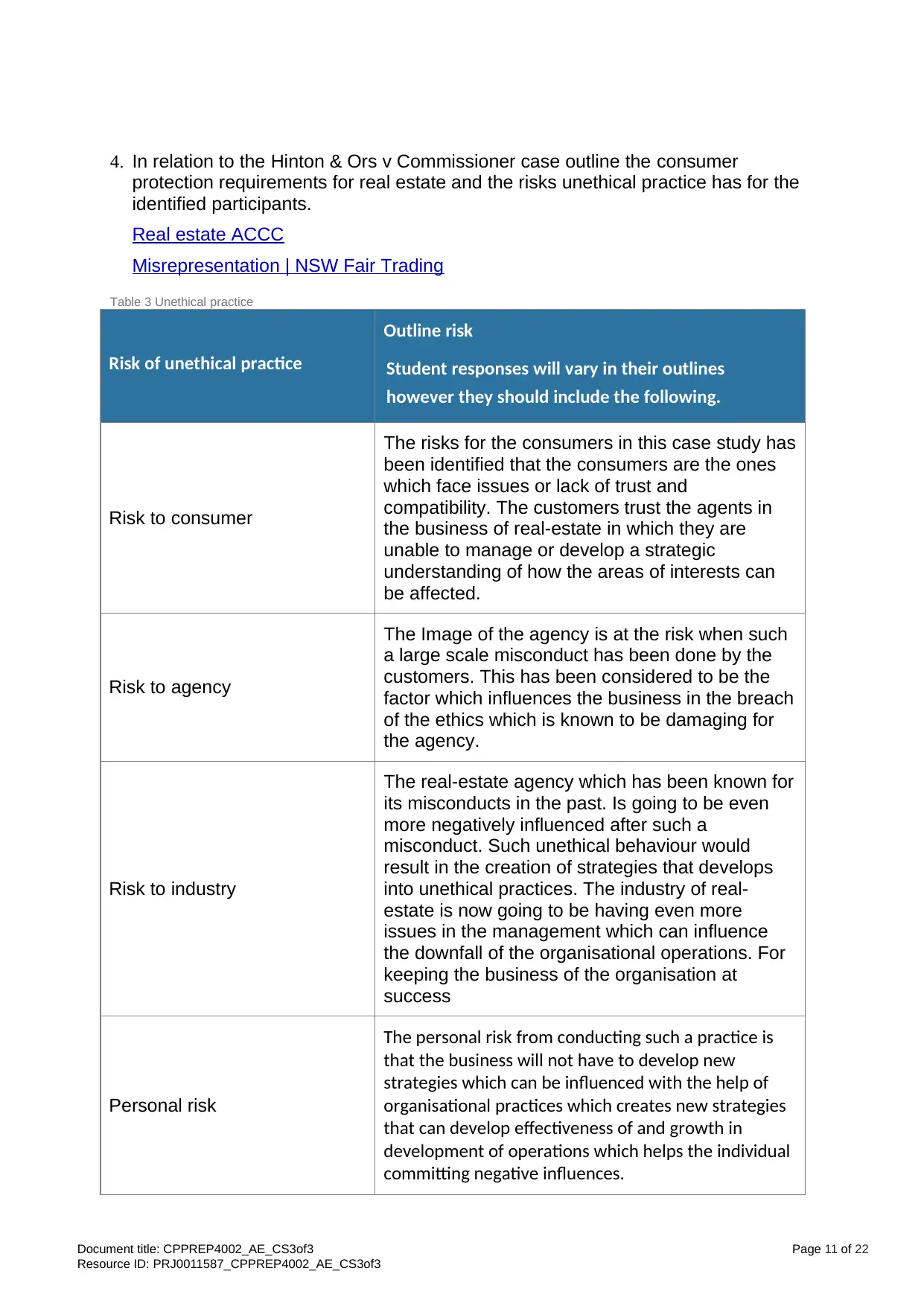
4. In relation to the Hinton & Ors v Commissioner case outline the consumer
protection requirements for real estate and the risks unethical practice has for the
identified participants.
Real estate ACCC
Misrepresentation | NSW Fair Trading
Table 3 Unethical practice
Risk of unethical practice
Outline risk
Student responses will vary in their outlines
however they should include the following.
Risk to consumer
The risks for the consumers in this case study has
been identified that the consumers are the ones
which face issues or lack of trust and
compatibility. The customers trust the agents in
the business of real-estate in which they are
unable to manage or develop a strategic
understanding of how the areas of interests can
be affected.
Risk to agency
The Image of the agency is at the risk when such
a large scale misconduct has been done by the
customers. This has been considered to be the
factor which influences the business in the breach
of the ethics which is known to be damaging for
the agency.
Risk to industry
The real-estate agency which has been known for
its misconducts in the past. Is going to be even
more negatively influenced after such a
misconduct. Such unethical behaviour would
result in the creation of strategies that develops
into unethical practices. The industry of real-
estate is now going to be having even more
issues in the management which can influence
the downfall of the organisational operations. For
keeping the business of the organisation at
success
Personal risk
The personal risk from conducting such a practice is
that the business will not have to develop new
strategies which can be influenced with the help of
organisational practices which creates new strategies
that can develop effectiveness of and growth in
development of operations which helps the individual
committing negative influences.
Document title: CPPREP4002_AE_CS3of3 Page 11 of 22
Resource ID: PRJ0011587_CPPREP4002_AE_CS3of3
protection requirements for real estate and the risks unethical practice has for the
identified participants.
Real estate ACCC
Misrepresentation | NSW Fair Trading
Table 3 Unethical practice
Risk of unethical practice
Outline risk
Student responses will vary in their outlines
however they should include the following.
Risk to consumer
The risks for the consumers in this case study has
been identified that the consumers are the ones
which face issues or lack of trust and
compatibility. The customers trust the agents in
the business of real-estate in which they are
unable to manage or develop a strategic
understanding of how the areas of interests can
be affected.
Risk to agency
The Image of the agency is at the risk when such
a large scale misconduct has been done by the
customers. This has been considered to be the
factor which influences the business in the breach
of the ethics which is known to be damaging for
the agency.
Risk to industry
The real-estate agency which has been known for
its misconducts in the past. Is going to be even
more negatively influenced after such a
misconduct. Such unethical behaviour would
result in the creation of strategies that develops
into unethical practices. The industry of real-
estate is now going to be having even more
issues in the management which can influence
the downfall of the organisational operations. For
keeping the business of the organisation at
success
Personal risk
The personal risk from conducting such a practice is
that the business will not have to develop new
strategies which can be influenced with the help of
organisational practices which creates new strategies
that can develop effectiveness of and growth in
development of operations which helps the individual
committing negative influences.
Document title: CPPREP4002_AE_CS3of3 Page 11 of 22
Resource ID: PRJ0011587_CPPREP4002_AE_CS3of3
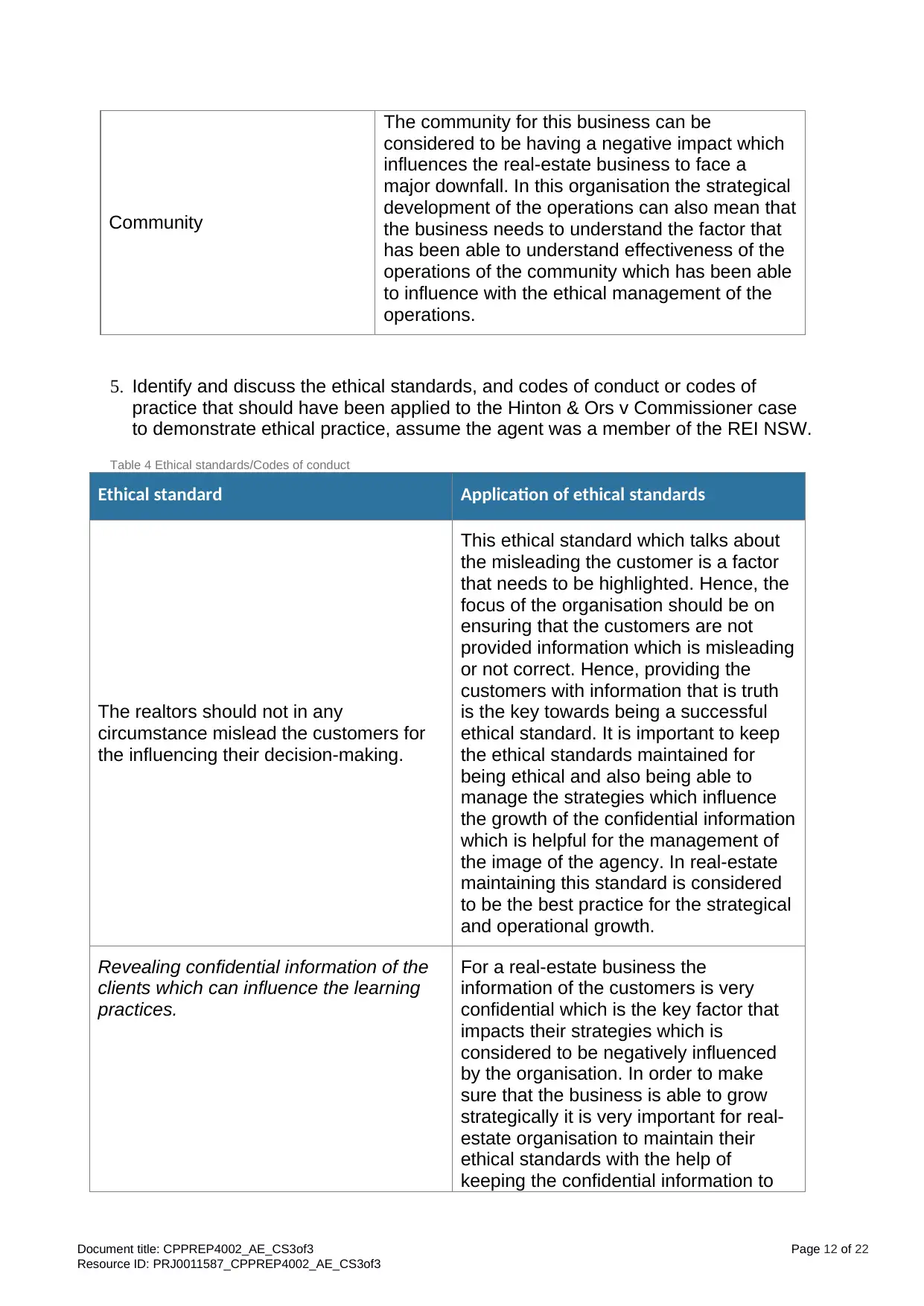
Community
The community for this business can be
considered to be having a negative impact which
influences the real-estate business to face a
major downfall. In this organisation the strategical
development of the operations can also mean that
the business needs to understand the factor that
has been able to understand effectiveness of the
operations of the community which has been able
to influence with the ethical management of the
operations.
5. Identify and discuss the ethical standards, and codes of conduct or codes of
practice that should have been applied to the Hinton & Ors v Commissioner case
to demonstrate ethical practice, assume the agent was a member of the REI NSW.
Table 4 Ethical standards/Codes of conduct
Ethical standard Application of ethical standards
The realtors should not in any
circumstance mislead the customers for
the influencing their decision-making.
This ethical standard which talks about
the misleading the customer is a factor
that needs to be highlighted. Hence, the
focus of the organisation should be on
ensuring that the customers are not
provided information which is misleading
or not correct. Hence, providing the
customers with information that is truth
is the key towards being a successful
ethical standard. It is important to keep
the ethical standards maintained for
being ethical and also being able to
manage the strategies which influence
the growth of the confidential information
which is helpful for the management of
the image of the agency. In real-estate
maintaining this standard is considered
to be the best practice for the strategical
and operational growth.
Revealing confidential information of the
clients which can influence the learning
practices.
For a real-estate business the
information of the customers is very
confidential which is the key factor that
impacts their strategies which is
considered to be negatively influenced
by the organisation. In order to make
sure that the business is able to grow
strategically it is very important for real-
estate organisation to maintain their
ethical standards with the help of
keeping the confidential information to
Document title: CPPREP4002_AE_CS3of3 Page 12 of 22
Resource ID: PRJ0011587_CPPREP4002_AE_CS3of3
The community for this business can be
considered to be having a negative impact which
influences the real-estate business to face a
major downfall. In this organisation the strategical
development of the operations can also mean that
the business needs to understand the factor that
has been able to understand effectiveness of the
operations of the community which has been able
to influence with the ethical management of the
operations.
5. Identify and discuss the ethical standards, and codes of conduct or codes of
practice that should have been applied to the Hinton & Ors v Commissioner case
to demonstrate ethical practice, assume the agent was a member of the REI NSW.
Table 4 Ethical standards/Codes of conduct
Ethical standard Application of ethical standards
The realtors should not in any
circumstance mislead the customers for
the influencing their decision-making.
This ethical standard which talks about
the misleading the customer is a factor
that needs to be highlighted. Hence, the
focus of the organisation should be on
ensuring that the customers are not
provided information which is misleading
or not correct. Hence, providing the
customers with information that is truth
is the key towards being a successful
ethical standard. It is important to keep
the ethical standards maintained for
being ethical and also being able to
manage the strategies which influence
the growth of the confidential information
which is helpful for the management of
the image of the agency. In real-estate
maintaining this standard is considered
to be the best practice for the strategical
and operational growth.
Revealing confidential information of the
clients which can influence the learning
practices.
For a real-estate business the
information of the customers is very
confidential which is the key factor that
impacts their strategies which is
considered to be negatively influenced
by the organisation. In order to make
sure that the business is able to grow
strategically it is very important for real-
estate organisation to maintain their
ethical standards with the help of
keeping the confidential information to
Document title: CPPREP4002_AE_CS3of3 Page 12 of 22
Resource ID: PRJ0011587_CPPREP4002_AE_CS3of3
⊘ This is a preview!⊘
Do you want full access?
Subscribe today to unlock all pages.

Trusted by 1+ million students worldwide
1 out of 22
Related Documents
Your All-in-One AI-Powered Toolkit for Academic Success.
+13062052269
info@desklib.com
Available 24*7 on WhatsApp / Email
![[object Object]](/_next/static/media/star-bottom.7253800d.svg)
Unlock your academic potential
Copyright © 2020–2026 A2Z Services. All Rights Reserved. Developed and managed by ZUCOL.





